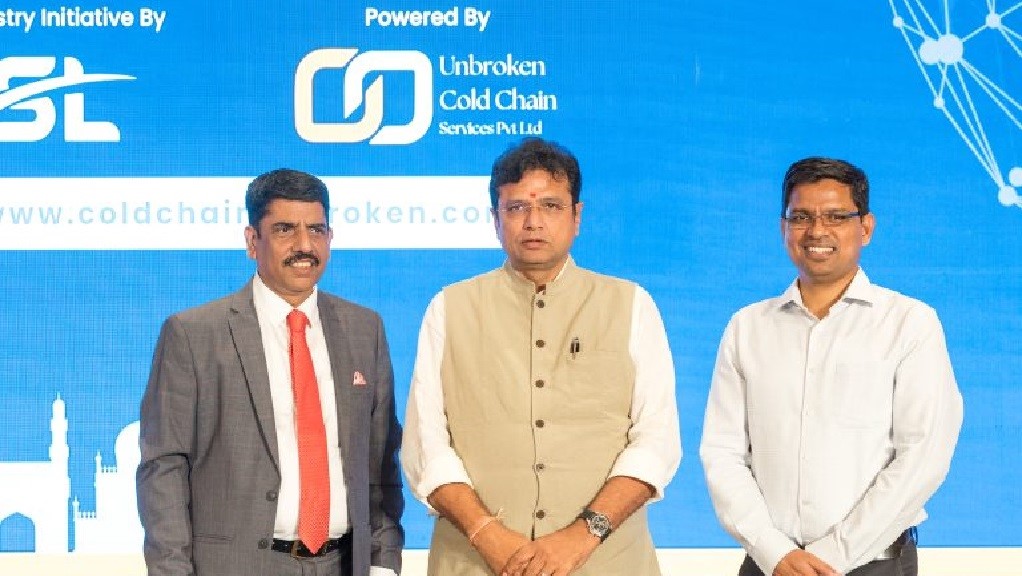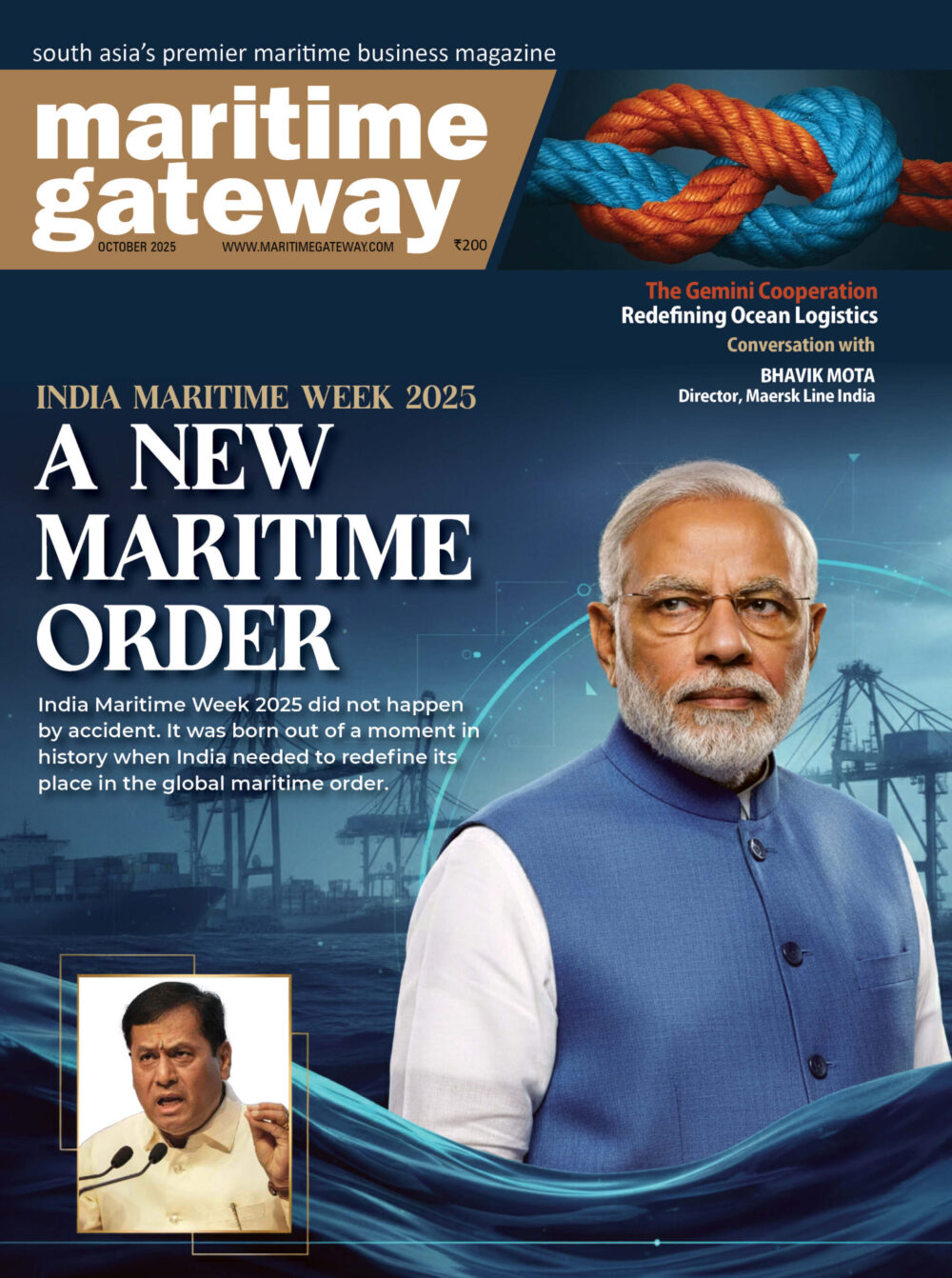Cold Chain Unbroken (CCUB-2024), an annual brainstorming event with the participation of several industry stalwarts and stakeholders, including airports, airlines, freight forwarders, shipping lines, and trucking companies, kicked off at Novotel Hyderabad on September 19. This event serves as a crucial platform for industry stakeholders to meet and discuss issues affecting the temperature-controlled logistics sector.
The 2-day conclave began with a great deal of enthusiasm from all delegates, and stakeholders. The inaugural session began with a brief introduction about CCUB events from Satish Lakkaraju, CEO, Nexgen Logistics, and Chairman of Cold Chain Unbroken (CCUB). Sundeep Prakash, IRS, Chief Commissioner, GST & Customs Zone, Hyderabad, was invited on to the stage as Chief Guest, and Sangeetha, IRS, Principal commissioner of Customs, Hyderabad, AVPS Chakravarthi, Managing Director, World Packaging Assn, and Pradeep Panicker, CEO, GMR Airport were also invited on to stage.
AVPS Chakravarthi in his key note addresshailed the paramount role played by logistics especially cold chain logistics during the Covid-pandemic not just by transporting temperature-controlled vaccines but in the initial days when vaccines were not there, they played a key role in supplying lifesaving medicines and food supplies across the world. He further prised the role played by the cold chain logistics in supplying perishable goods, and critical goods even during the lockdown period to ensure sustenance of life. He has thrown light on how technologies are driving new active and passive packaging solutions and making cold chain logistics evolve better in the modern times. He highlighted the role of cold chain logistics in mitigating the Covid-pandemic effects.
Sandeep Prakash, the Chief Guest, in his address said: “India is the vaccine hub, as about 50-60% of the global vaccines are produced in India. The pharma industry’s turnover in India last year was $65 bn, and we exported about $28bn of pharma. In 2030, the turnover is expected to reach to about $100bn mark, and by 2047, the govt’s intention is to take it to $450bn. So, we are looking at an almost 7x increase in the next 23 years.” He said that it is obvious if India has to grow like this; all the stakeholders will have to support the industry. He reiterated his commitment to support industry from the customs side in increasing the exports with an unbroken cold chain, as it is very vital for pharmaceutical exports. He said that as per statistics over 60% of exports from Hyderabad air cargo complex was that of pharma products.
He elaborated on how Indian customs has taken several trade-friendly initiatives like Electronic Data Interchange (EDI) introduced in 1996, by 2004-05 almost 100% of Indian customs Exim documentations became online, and self-assessment was also introduced. He further said that in 2023-24 almost 90% of import consignments in air cargo complexes and 93% export consignments across India went without any human intervention from the customs side. He also threw light on some pain points in container stagnation and appealed to the industry to ponder over practical solutions to mitigate such problems.
Pradeep Panicker, while giving vote of thanks highlighted on how Hyderabad airport needs to increase its capacity to meet upcoming 7x growth. He said that Hyderabad Airport currently handles about 15,000t of cargo, and GMR has been expanding capacity at the existing cargo terminal 1 from 15,000t to handle about 300,000t by March 2026. He has also informed that GMR also has started construction cargo terminal 2 at the airport, which is likely to come into operation soon.
The inaugural session was followed by a presentation by Thijs Veerman, CEO, Catherinn BV.
The first panel discussion on ‘Elevating Cold Chain Infrastructure: Airports as Logistics,’ was moderated by Keku Bomi Gazder, MD & CEO, AVIAPRO. The speakers include Ashish Kumar, E.V.P & Chief Commercial Officer, GMR Hyderabad International Airport Ltd, Milton De La Paz, Vice President Airline Relationship & Business Development Cargo, Dallas Fort Worth (DFW) International Airport, Manish Agnihothri Agnihotri, Chief Executive Officer, WFS (Bengaluru) Private Limited, Manoj Singh, Chief Cargo Officer, Adani Airport Holdings Ltd.
The expert panel delved deep into the evolving role of airports in cold chain logistics, with key takeaways on: The industry’s ongoing commitment to sustainability, paving the way for greener cold chain logistics. They have also thrown light on the role of end-to-end cold chain management in improving cargo handling efficiency and reducing spoilage, and the importance of advanced cold chain infrastructure at airports, and how it’s reshaping the logistics landscape for temperature-sensitive cargo. The panel also discussed the game-changing potential of smart, temperature-controlled warehouses equipped with automation and real-time monitoring, and the growing need for collaboration between airports, airlines, and logistics providers to build a connected, resilient network.
It was followed by a firisidechat on ‘Investment in Cold Chain: A Strategic Outlook’ with Kalyan V Sivalenka, CFA, Founder & Managing Director & CEO, Springforth Capital Advisors,and
Yashpal Sharma, Managing Director, Skyways Group.
The second panel discussion began on ’Mastering Hazardous Materials in Cold Chain: Safety, Compliance, and Innovation’, which was moderated by P Balasubramanian, Founder & CEO, ACCIS. It was participated by Ramesh Mamidala, Head Cargo, Air India, Kamesh Peri, Chief Executive Officer, Celebi Delhi Cargo Terminal Management India Pvt. Ltd, Radha Ramanan Panicker, Managing Director, Dangerous Goods, DGM India, and Amritendu Mukherjee, Head Global Logistics, Dr Reddys’ Laboratories as expert speakers.
The panellists have touched upon regulatory and operational hurdles of transporting Dangerous Goods (DG) cargo. They have stressed the importance of training and upskilling to ensure safe and efficient DG handling, and highlighting the need for trust and transparency as the cornerstones of successful DG cargo transport.
The third panel discussion titled ‘Developing Smart and Sustainable Warehousing for Cold chain’ was moderated by Mr. Arif Azal Siddiqui, CEO, Coign Consulting. The panel included Kiran Gubba, CEO, Gubba Cold Storage, Chandrakala Bobba, Director, Bobba Group, Mohit Kumar Giri, Co-Founder, Indicold Private Limited, and Mahesh Gupta Vodela, Managing Director, HMDA Truck Dock Logistics Pvt Ltd as distinguished speakers.
The panellists have shed light on the challenges in cold chain warehousing facilities and how to make them energy-efficient through tech support. They have also touched up on scope of private investment opportunities in warehousing sector and opportunity for growth in intercity and intracity warehousing facilities development in future.
Later in the day D. Sridhar Babu, Minister for Industries and IT, Telangana along with Dr E Vishnu Vardhan Reddy, IRS, Special Secretary, Industries and commerce, Govt. of Telangana, has visited and inaugurated a C-Safe facility and attended the stalls at CCUB-2024 event. The Minister while addressing the event elaborated on the steps taken by the government of Telangana in enhancing cold chain logistics development in the state. He further elaborated on govt’s efforts to establish a Centre of Excellence (CoE) with collaboration from University of Birmingham to improve the logistics arena, and how such an institution helps logistics sector to offer tailor-made solutions to the logistics industry.
Dr E Vishnu Vardhan Reddy, IRS in his address lauded the efforts made by CCUB and hailed the importance of cold chain logistics in curtailing the wastage in perishable goods and also helping farmers get benefitted.









